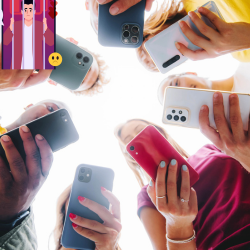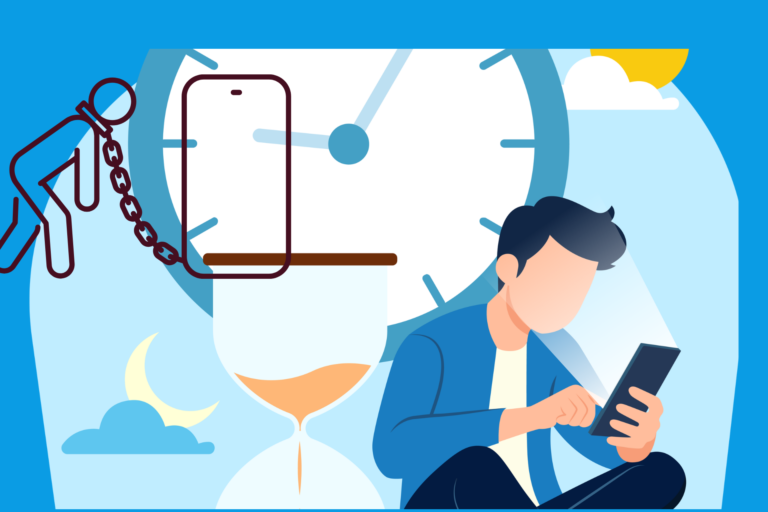Comprehension Reading & Vocabulary

Phone addiction had swallowed my days, leaving me trapped in a cycle I no longer controlled. At first, I brushed off the warnings, convinced I could quit anytime. But as I scrolled endlessly through meaningless content, my world outside the screen faded. Phone addiction dictated my every move, every waking moment, leaving me disconnected from reality.
I woke up each morning with my phone clutched in my hand. Phone addiction ensured my first instinct wasn’t to stretch, savour the morning air, or even acknowledge the real world. Instead, my fingers moved mechanically, unlocking the device, checking notifications, and diving into social media. I craved the validation (approval or confirmation) each like, comment, and message gave me. The gratification (a sense of pleasure or satisfaction) was instant but fleeting. Hours would pass, and I would still be glued to the screen, oblivious to time slipping away. Phone addiction made me believe this was normal.
One morning, my younger sister, Sophie, walked into my room. “You missed breakfast again,” she sighed, crossing her arms. “Mom’s worried. She says you’re always staring at that thing.”
I frowned but barely looked up. Phone addiction was louder than Sophie’s voice. “Just one more minute,” I murmured, watching a pointless video about a cat riding a skateboard. My days’ monotony (lack of variety and interest) was blurred by the illusion of entertainment my phone provided. I had stopped engaging in real conversations, spending time with family, or even going outside. My friendships dwindled, and I barely kept up with school assignments. My once meticulous (showing great attention to detail) work had become rushed and careless. Phone addiction made everything else feel secondary.
The real wake-up call came when I nearly lost my job. As a part-time content writer, I was once prolific (producing a large amount of work), meeting deadlines with ease. But phone addiction had eroded my efficiency. My boss sent an email filled with veiled (indirectly expressed) warnings about my declining performance. That should have been enough, but I convinced myself I was just “multitasking”—writing and scrolling at the same time. The reality? Phone addiction was wrecking my career, my health, and my personal life.
One night, while lying in bed with my phone illuminating my tired face, I stumbled upon an article on phone addiction. It was like reading about myself—a case study in detachment, anxiety, and lethargy (lack of energy). I had the classic symptoms: checking my phone first thing in the morning, feeling restless without it, and losing hours to mindless scrolling. Phone addiction wasn’t just a bad habit; it was consuming me. My heart pounded. I wasn’t just someone who liked their phone; I was addicted.
Determined to break free from phone addiction, I set a goal to go a full day without my phone. The first few hours felt excruciating (intensely painful or difficult). My hands twitched, reaching for a device that wasn’t there. Phone addiction had rewired my brain, making absence feel unbearable. I felt disconnected, missing out on the constant stream of updates. But by noon, something strange happened—I noticed the sounds outside my window, the rustling of trees, the distant laughter of children playing. I picked up an old book and started reading, something I hadn’t done in years.
The next day, I left my phone in my drawer while working. My productivity skyrocketed. I finished a week’s worth of assignments in one afternoon. The feeling of accomplishment was more profound (deep and meaningful) than any notification I had ever received. Yet, the real challenge was social interaction. Without phone addiction as my crutch (something relied on excessively), I struggled to hold face-to-face conversations. My thoughts felt disjointed, my patience tested.
Sophie noticed my efforts. “You’re trying, aren’t you?” she said, sitting beside me on the couch, a book in her hand. I nodded, hesitant. “It’s hard,” I admitted. “I didn’t realize how much phone addiction had controlled me.”
“You weren’t living,” she said simply. Her words were poignant (evoking a sense of sadness or regret). Phone addiction had wasted so much of my time, trapping me in a virtual world while real moments passed me by.
Determined to keep going, I made small changes—disabling notifications, deleting time-wasting apps, and setting screen limits. I started jogging in the mornings, spending time with my family in the evenings, and calling friends instead of texting. It wasn’t a perfect journey; phone addiction still lingered, and I relapsed a few times, falling into old patterns. But the difference was, that I no longer ignored the problem.
The biggest test came when I attended a family gathering. For the first time in years, I was fully present. I listened to stories, laughed at jokes, and made real eye contact. It was liberating (freeing). When I finally checked my phone, there were dozens of missed messages, notifications, and updates. But I no longer felt the rush to respond. Phone addiction had once dictated my every move, but now, the real world—the one beyond the screen—had become more interesting.
Phone addiction had stolen years from me, but I was taking them back, one moment at a time.
ADDICTION
Addiction is a compulsive need for and use of a habit-forming substance or behavior, despite its harmful consequences.
PHONE ADDICTION
Phone Addiction is the excessive dependence on mobile devices, leading to negative effects on mental, social, and physical well-being
Click on the link below, and discover essential pronunciation hacks.
https://fluent-eng.com/english-pronunciation-hacks-sound-more-natural/

